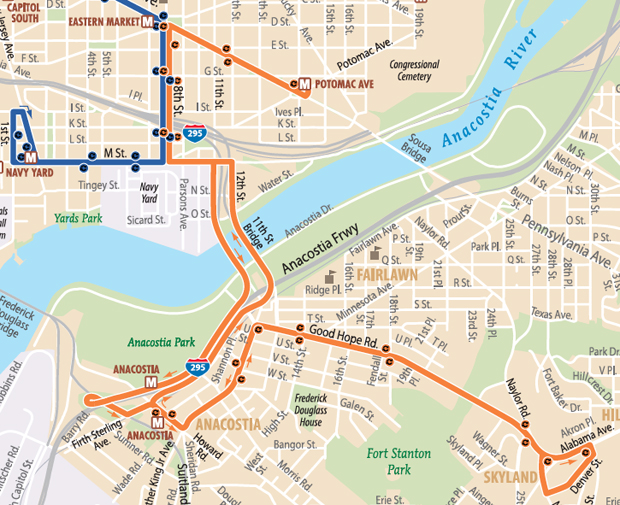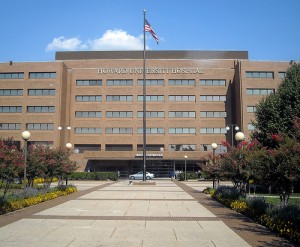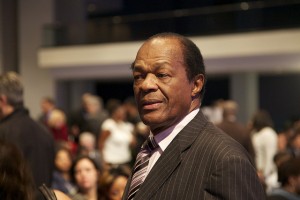The Martin Luther King, Jr. Memorial Library at 9th and G Streets, NW was to join all other District libraries in closing on Sundays due to budget cuts. But Mayor Vincent Gray announced over the weekend that the city’s largest library will remain open on Sundays, thanks to an addition of $316,000.
DC Circulator Starts Traveling East of the River
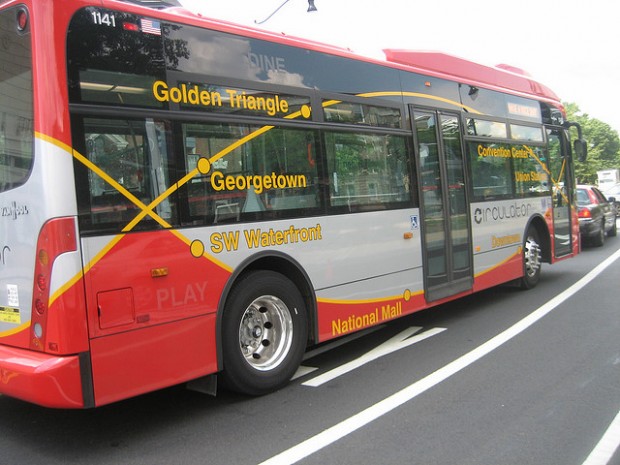
Wayan Vota / Flickr
DC Circulator, the inexpensive, reliable and quick way of getting around the city, made its first trip east of the Anacostia River today. The new line travels from the Potomac Avenue Metro to Skyland via Barracks Row.
Getting across the Anacostia River to where most of the city’s jobs are located can be a time-consuming or expensive undertaking. That can be a particular challenge in Ward 8, where 20 percent of people earn less than $10,000 a year. Circulator trips cost a dollar and buses arrive every 10 minutes between 6 a.m. and 7 p.m.
The D.C. Department of Transportation was able to expand across the river after canceling the Convention Center-SW Waterfront route due to low ridership.
Tasty Morning Bytes – River History, Impoverished Children and Addressing Food Deserts
Anacostia River: From then till now “Prince George’s County was home to huge slave plantations before the Civil War, and after the war, many of those freed slaves remained. A major refugee center was set up on the eastern banks of the river. The Freedmen’s Bureau bought 375 acres and sold small lots to the former slaves. And so it was that the area just across the Anacostia became home to many blacks (including Douglass). More affluent whites gradually settled along the Potomac, particularly the high bluffs overlooking the river.” (The Washington Post)
Promise Neighborhoods: DC Grant Winners Share Their Trials and Triumphs “We can’t just narrowly focus on what resources a student has in class. We’ve been there, done that, and it doesn’t work. So let’s try something different. President Obama has invested federal funding to spur creativity and innovation at the neighborhood level and is letting that work its way up.” (The Root)
Record Number Of Hispanic Children Living In Poverty “The study finds that besides high unemployment, Hispanics also suffered the greatest loss of wealth of all ethnic groups, primarily due to foreclosures. As the Latino birth rate continues to outpace that of whites and blacks, the number of poor Latino children could grow even more.” (wamu.org)
Continue reading
There are Only 90 Doctors East of the River
If you reside in Columbia Heights, Dupont Circle or Friendship Heights, chances are, you live near a practicing physician. For D.C. residents who make their home east of the river, it’s a very different situation, according to a recent article in the Washington Post, which focused on a potential shortage of doctors in this city. One part of the article stood out to us; when it comes to a lack of practicing physicians, certain areas in D.C.- have it much worse than others.
In Ward 3, for example, there is an abundance of physicians, with “literally hundreds of doctors to choose from,” said Michael Williams, chief of health-care operations for the nonprofit D.C. Primary Care Association. But he said only 90 doctors list a business address east of the Anacostia River.
The District has a “severe mal-distribution of physicians” rather than a shortage, given that roughly 23 percent of the population lives east of the river but only a tiny fraction of physicians have a business location there, he said.
The Post reported that there are 4,000 full- or part-time physicians in D.C. but it’s important to keep in mind those doctors are sometimes seeing patients who work in the city, but live in Maryland or Virginia. So doctors who maintain a practice in the city are treating patients from across the region, which for locals makes finding a doctor even more challenging.
Tasty Morning Bytes – Obama Shops Target, Tuskegee in D.C. and Fenty Regrets Nothing
Good morning, DCentric readers!
Michelle Obama Shops At Washington-Area Target “She spent 30 to 40 minutes shopping, pushing her own cart. She apparently was recognized only by the cashier who rang up her purchases. Since coming to the White House, Mrs. Obama has lamented missing out on what she calls ‘normal stuff,’ like Target runs.” (WUSA 9)
What Happened When I Tried To Buy A Cupcake On The Saint E’s Campus “Today, standing outside of the gates looking in, being humiliated by a security officer that made me feel as if I should have known better, I was made to feel like less than a person, less than a tax payer, less than a resident of the District of Columbia. It didn’t matter that I literally lived up the street, the message was clear: this was not for me and my Ward 8 neighbors. We could look but not touch.” (Congress Heights on the Rise)
Obama’s unfortunate remarks on people’s misfortunes “Things turned ugly for me when Obama, in closing, said: ‘I don’t have time to feel sorry for myself. I don’t have time to complain.’ Whether Obama was referring directly to black leaders or indirectly to their financially stressed and frustrated constituents, his point was unnecessary. The people I hear from and personally counsel aren’t sitting around in bedroom slippers grumbling. They don’t have time nor can they afford to just complain. They’re trying desperately to make ends meet.” (Washington Post)
Re-creating the Tuskegee experiment? “Is the District preparing to conduct its own Tuskegee experiment? The synopsis: D.C. Council member David A. Catania is pushing legislation that would mandate mental and behavioral analyses of youths as young as 3, and city schools Chancellor Kaya Henderson testified Tuesday that she has bought into his misguided proposal.” (Washington Times)
Continue reading
D.C. May Lose One of the Last Remnants of Black Broadway
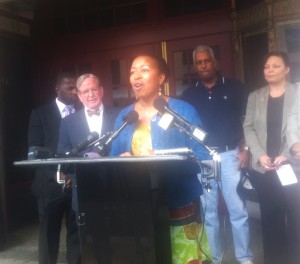
Elahe Izadi / DCentric
Cynthia Robbins, Lincoln Theatre board member, makes an appeal for funding to save the theater.
When the Lincoln Theatre opened in 1922 on U Street, it was one of the jewels of “Black Broadway.” But with money running out, the historical landmark is at risk of closing.
“They say, ‘Before Harlem, there was U Street,’” said Rahim Muhammad, who grew up in the area. “So to me, the Lincoln is more important than the Apollo.”
During a Thursday afternoon press conference in front of Lincoln Theatre, board members blasted Mayor Vincent Gray for not answering their calls to hold a meeting to discuss saving the theater. Gray has said the theater’s business model is “not sustainable” and that the city couldn’t “pour money” in it.
Without a $500,000 boost, board members said the theater could close by the end of the year.
The possible closure of the Lincoln Theatre may be a sign of bad economic times. But some say the theater, on a now totally-gentrified corridor, holds a special place in D.C.’s black history and it should be preserved.
Rick Lee, a Lincoln Theatre Board member, criticized the city for giving money to other theaters such as Ford and Arena Stage, and yet failing to allocate anything to the Lincoln Theatre in Fiscal 2012, which begins Oct. 1. They have received $250,000 in past years.
“Even though the mayor is black, I almost feel like it’s a racial thing because I don’t see why you would have this theater, as beautiful as it is with all of this potential, and nickel and dime it,” Lee said. “I’m offended.”
“Inequality Hurts: The Unhealthy Side Effects of Economic Disparity”
Does D.C. Need Gentrification Commmissions?
When neighborhoods get gentrified, the most vulnerable are often caught off guard. Community activism doesn’t typically gain steam until the prospect of being displaced is eminent.
So Ward 8 Councilman Marion Barry’s idea to convene a gentrification commission is interesting, particularly since Ward 8 isn’t really being gentrified. Sure, some wealthier residents have moved in, but residents are rarely being displaced as a result. There is some development in the pipeline, but it’s uncertain what kind of effect it’ll have on the area
“My problem with gentrification is that those persons come into our community and displace longtime residents,” Barry said during Wednesday’s gentrification panel discussion. “Shaw is a classic example. We saw it coming and we did virtually nothing.”
Ward 8 is ripe for gentrification, Barry said, particularly given the high number of renters. Panel speakers referred to gentrification as a looming, unstoppable force. Yes, there were some mentions of dogs and bikes, and Barry remarking that “we have a lot of gentrifiers who are blogging, who are twittering.” Most of the discussion didn’t focus on race, but rather on protecting residents from being displaced through addressing the root causes of poverty: education, jobs and whether residents have become dependent on government assistance.
DCentric Picks: 30 Americans

Courtesy of Rubell Family Collection, Miami.
Jean-Michel Basquiat, Bird On Money, 1981. Acrylic and oil on canvas, 66 x 90 inches.
What: 30 Americans exhibit.
When: Opens Saturday and runs through Feb. 12.
Where: Corcoran Gallery of Art, 500 17th St. NW.
Cost: Free for children under 12, $8 for seniors and students and $10 for adults.
Why you should go: Although the exhibition isn’t free, it’s definitely worth the cost. The 30 Americans exhibit showcases art from the most important African American artists of the past 30 years. Works by Jean-Michel Basquiat, David Hammons and Kehinde Wiley will be on display, and much of the art focuses on racial, historical and sexual identity.
Other events to consider: Learn more about Turkish culture at the Turkish Festival. The free event features food, dance performances and crafts. It takes place 11 a.m. to 7 p.m. at Freedom Plaza.
Tasty Morning Bytes – Posh Bottled Water, Fast Food Stamps and a Gay Black Gang
Good morning, DCentric readers. Ready for some newsy links?
Pulp to Close in November “On a wider scale, the closure comes at a fragile time for the corridor — which, as both long-standing retail fixtures and relatively recent additions are vacating, is experiencing a real shake-up…’The day is rapidly approaching when I won’t be able to buy anything on 14th Street except a $10,000 sofa and a $100 dinner’.” (DCist)
Council drinks high-end bottled water at breakfast “Wednesday morning’s D.C. Council breakfast with the mayor featured your typical buffet spread with one snazzy feature: pricey Voss brand bottled water, which sells for a few bucks per bottle. Is this part of the council’s effort to be more civil to one another?” (Washington Examiner )
Food Stamps for Fast Food: An Absurd Idea “Poor nutrition habits contribute to an obesity epidemic that affects everyone, especially children, the poor and people of color. That’s why allowing food stamps to be used at fast food restaurants is absurd. It makes no sense to use government funds to purchase foods that contribute to disease and increased health care costs.” (The New York Times)
Continue reading




